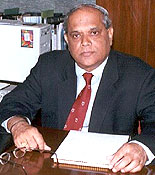Business and the roots of creativity
26 September 2006
The royal road to creativity is the path less travelled, the experimental product or service, taking a leap of faith in the dark and doing your best to learn as you go along, writes S Ramchander*, strategy consultant and author of the forthcoming title, Creativity@Work.
 Creativity is invariably and most commonly associated with the artistic world. The word brings to mind immediately names such as Picasso and Shakespeare, in India of Satyajit Ray, Ravi Shankar or M S Subbalakshmi. Yet creativity has a far broader meaning. It is a feature of life everywhere and in everyone's life.
Creativity is invariably and most commonly associated with the artistic world. The word brings to mind immediately names such as Picasso and Shakespeare, in India of Satyajit Ray, Ravi Shankar or M S Subbalakshmi. Yet creativity has a far broader meaning. It is a feature of life everywhere and in everyone's life.
The essence of creativity is doing something not tried or thought of before, and this includes making the hidden connections between phenomena hitherto not seen together. In this sense a customer relations manager in a bank or a hotel who uses her ingenuity and initiative to solve a customer's problem instantly is doing something creative – and is doing her job in a creative way.
Practical creativity or "creativity at work" can therefore extend to a product or service, a method or a way of thinking or indeed an approach to life itself. innovation, or invention its near synonym, is but one expression of it. Innovation usually has a focus: a device such as the iPod or the 'Post It' pads, things that never existed some years ago, which we take for granted today.
Why is it important to study the subject today? One good reason is that the fast paced modern life, especially since the opening up of the Indian economy to the world as a market place and source for all sorts of resources, offers most of us very little time to attempt something really different in our own place of work or daily routine. The simple reason is that the trodden path is faster and seems safer and appears to demand less of an effort or risk.
Yet everyone insists that innovative ways are the only way to develop and preserve any sort of competitive advantage. On the other hand, popular management books emphasise comparative metrics a good deal; and benchmarking of the best practices of other organisations is a favourite recommendation of the gurus although often this means one merely does what someone else does, perhaps a little bit faster or at less expense.
